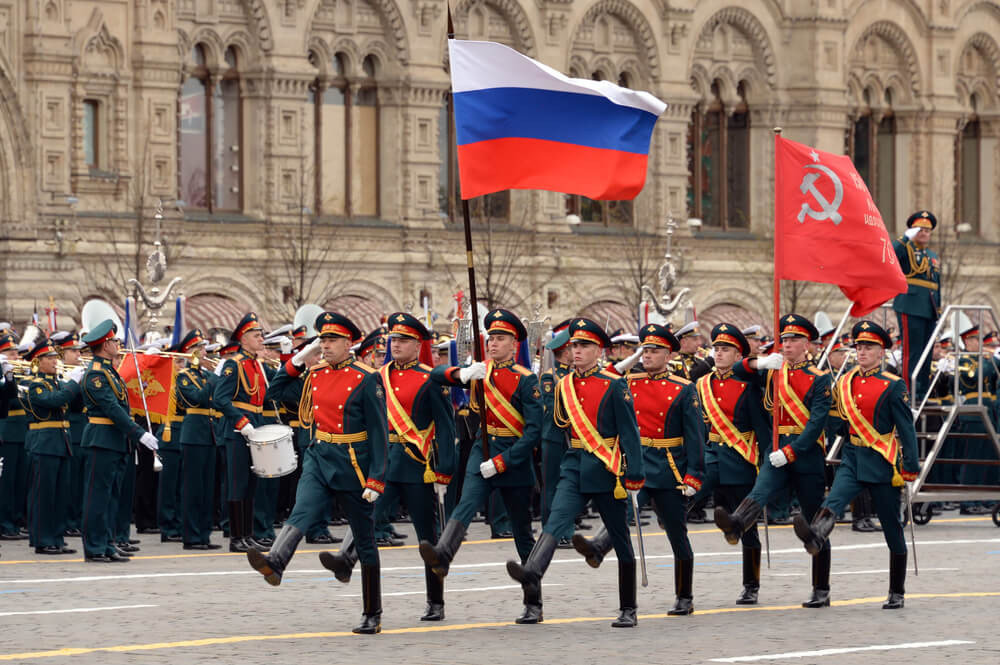The presidential inauguration and the Victory Day celebrations on May 9 were a great demonstration of the personality cult surrounding Vladimir Putin, with the message that this cult wants to remain untouchable for a long time to come.
Every situation during the two festive events was carefully designed to promote the strength of the leader, his patriotism, and his infallibility. And Putin personally tried to reinforce this impression.
On his way to the inauguration, Putin stopped next to a picture on the Kremlin wall and watched it for a moment, as seen on live television.
In the years he has spent in the Kremlin, Putin has certainly seen this picture many times, but with this gesture, he wanted to show everyone in Russia that the formalities and protocols do not apply to him, a ruler and owner of the Russian empire.
Ironically, but not coincidentally, Patriarch Kirill of the Russian Orthodox Church, in his servile congratulatory message on Vladimir Putin’s inauguration, said that he wishes Putin would be the president for the rest of his life.
It was no coincidence that the officers seated next to Vladimir Putin during the May 9 Victory Day parade were Russia’s commanders from Bucha, Ukraine, where mass war crimes were committed.
Vladimir Putin invited those officers not only to spit in the face of the international community but also to demonstrate to Russian elites that participating in war, committing war crimes, and sponsoring and facilitating war are the means to be near him, which is equivalent to survival in today's Russia for the Russian upper class.
During the inauguration and May 9, Victory Day, Russia increased its nuclear rhetoric. It was also not a coincidence.
Putin believes that this will persuade European and American voters to vote for politicians who are afraid of a conflict with Russia in this year's elections.
A message to the powerful
Despite widespread support for his policies, particularly the invasion of Ukraine, Putin clearly needed another demonstration of the strength and incontestability of his rule.
This display of force was targeted specifically at the powerful circles in Moscow.
The Russian upper class is mainly composed of educated and intelligent individuals. They are aware of what is happening, yet they are surviving and/or capitalising on the situation.
There are no elections in Russia, and the Russian political hierarchy is dominated by smart and intelligent people who rise to the top through complex internal tribal manoeuvring and corruption schemes.
Most people in the Russian political and upper classes know that Russia is an aggressor
Most of these people know the truth about the war. Most people in the Russian political and upper classes know that Russia is an aggressor who has attacked Ukraine because Russia did not tolerate Ukraine’s decision to affiliate with the West.
But, regardless, they will accept and repeat the false sentiment about the war just to blend in and possibly survive in Russia, a country that Vladimir Putin and the people around him turned into a version of the KGB/FSB directorate.
Master of the past and the future
The presidential inauguration and another Victory Day war parade served as a stark reminder that opposing the supreme leader's power, as exhibited so magnificently during the May 7 and 9 events, is dangerous.
Putin attempted to depict himself not only as the man who determines Russia's future but also as the one who can alter historical facts to suit his current and future global agenda.
Putin stated that throughout the first stage of the WW2 Russia only fought fascism while the rest of Europe helped Hitler
During one of his public addresses at the May celebrations, he stated that throughout the first stage of the Great Patriotic War (1941–1945), Russia only fought fascism while the rest of Europe helped Hitler.
Putin needed such a demonstration of power because he is aware that his political, security, and economic environment can be volatile in times of crisis.
War and oppression will increase
Many of them were thrilled when the Russian army in Ukraine began to crumble, knowing that the real reasons for the invasion of Ukraine stem from the distorted projection of a vengeful leader.
However, their desire for the military campaign against Ukraine to fail has faded with time, owing primarily to the West's hesitancy and the widespread anticipation that one day they would have to negotiate with Putin directly.
 The May Day celebrations in Moscow strengthened Putin's reputation as an unquestionable and adored leader
The May Day celebrations in Moscow strengthened Putin's reputation as an unquestionable and adored leader
This was the time when many discouraged members of the Russian elite started to become pro-war and anti-Ukraine.
They concluded that the West was still unable to realise that Russia was on a course that could not be reversed from within, so that it no longer posed a threat to the world, particularly Europe.
The May Day celebrations in Moscow strengthened Putin's reputation as an unquestionable and adored leader. Their militaristic tone, laced with patriotic propaganda slogans, had the effect of both mobilising and intimidating.
Their position was clear: the war will intensify, domestic repression will increase, and Russia under Vladimir Putin will harm and damage the West in every conceivable way.